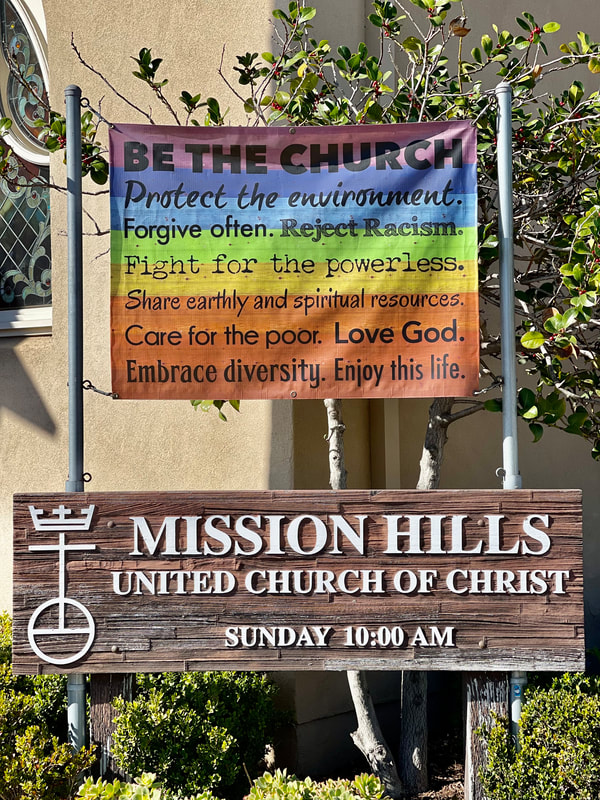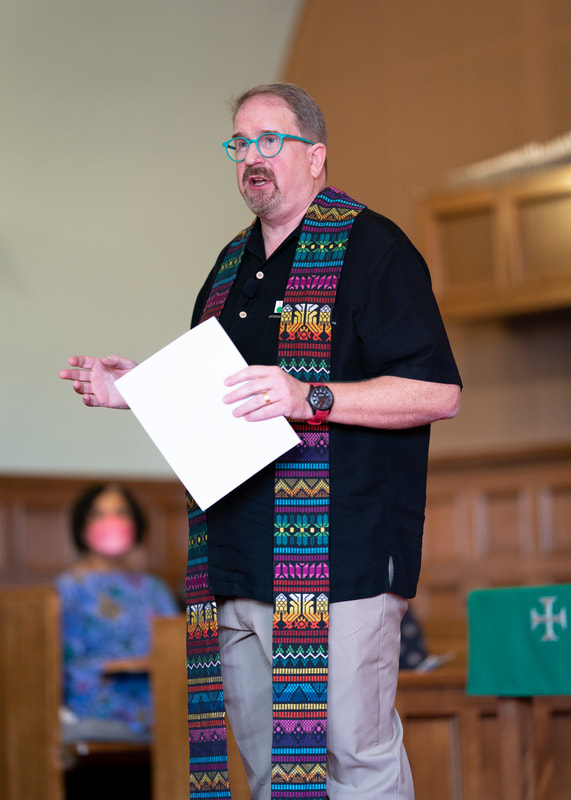 Sermons from Park Hill Congregational UCC Denver, Colorado Rev. Dr. David Bahr [email protected] September 10, 2017 “Love Does No Wrong to a Neighbor” Romans 13: 8-10 – New Revised Standard Version 8 Owe no one anything, except to love one another; for the one who loves another has fulfilled the law. 9 The commandments, “You shall not commit adultery; You shall not murder; You shall not steal; You shall not covet”; and any other commandment, are summed up in this word, “Love your neighbor as yourself.” 10 Love does no wrong to a neighbor; therefore, love is the fulfilling of the law.” As Hurricane Harvey’s wrath descended on Texas, Alonso Guillén was determined to help rescue people stranded in floodwaters. On Aug. 29, he left his job early to pile into his white Chevy Tahoe with a group of friends. The father of this 31-year-old Mexican immigrant, a Dreamer who came to the US as a child, begged him not to make the 120-mile trek from Lufkin. “It is too dangerous,” his father pleaded. But when it came to helping others, Alonso was too headstrong to listen. Once there, the friends set out on five boats and used an app on their phones to identify people who needed rescuing. Late that night, as Alonso and his group were on their way to pluck survivors from an apartment complex, their rescue boat slammed into an Interstate 45 bridge support. The collision killed Alonso and one friend. “He died wanting to serve,” said his brother Jesus. “He could have stayed home watching the news on television, but [this Dreamer] chose to go help.”[1] The response of our Attorney General was “The compassionate thing is to end the lawlessness, enforce our laws… [to] advance the interests of the nation.”[2] That’s Jeff Sessions announcement rescinding DACA, protection for the Dreamers brought to the US as young as infants and toddlers who have lived their entire lives here. “Get out. Or, sort of get out. We’ll let you know. But, either way, you’re definitely not wanted even if you do stay.” What does scripture say about that? Leviticus 19:33-34 and 24:22 says – “When the alien resides with you in your land, you shall not oppress them. The alien who resides with you shall be to you as the citizen among you; you shall love the alien as yourself, for you were aliens in the land of Egypt: I am the Lord your God.” The Word of the Lord. Thanks be to God. [3] And Exodus 12:49 – “There shall be but one law for the native and for the alien who resides among you.” These texts are inter-changeably translated alien, immigrant, stranger, foreigner – they are all forms of “other.” Forms that mean “someone else,” “something different.” But remember, scripture repeats over and over, that once included you. Deuteronomy 1:16 – “Give the members of your community a fair hearing, and judge rightly between one person and another, whether citizen or resident alien.” The Word of the Lord. Thanks be to God. Exodus 22:21 – Moses: “You shall not wrong or oppress a resident alien; for you were aliens in the land of Egypt.” The Word of the Lord. Thanks be to God. And on and on it goes. But one more: Deuteronomy 10:18-19 – “For the Lord your God...loves the strangers, providing them food and clothing. You shall also love the stranger, for you were strangers in the land of Egypt.” The Word of the Lord. Thanks be to God. Words are important. And it’s probably the word compassion that upset me most by the announcement – in addition, of course, to the actual matter at hand. But don’t put that word on the lips of your mouth. Don’t defile the word compassion. Compassion means with, not against. And, as Paul said to the Romans, “Love does no wrong to a neighbor.” Both the Old and New Testaments repeat repeatedly: “Love your neighbor as yourself. You must love your neighbor as yourself.” Over and over. And that is the Word of the Lord. Thanks be to God. Not quite clear about his meaning, or simply seeking to test him, a lawyer asked Jesus, but who is my neighbor?[4] Harriet Jacobs was the first female to write a slave narrative in 1861. It was called Incidents in the Life of a Slave Girl. She retells a story from her early childhood about the woman who owned her – an abolitionist. That’s someone who wanted to end slavery. Harriet described her as kind and considerate. She taught Harriet to read and to understand the Bible. The woman especially loved telling and re-telling the story of the Good Samaritan – Jesus’ answer to the question, Who is my neighbor. When her owner died, Harriet believed she would finally be freed, but at the reading of the will she discovered she had been bequeathed to a 5-year-old niece. Harriet couldn’t believe it. Harriet understood the Bible well enough to realize that her owner’s favorite story didn’t include slaves in her definition of neighbor. Slaves were someone else, something different, something other than neighbor. Harriet understood the Bible better than the woman who taught her. And it left her bitter and deeply wounded.[5] Harriet understood, “Love does no wrong to a neighbor.” That’s the Word of the Lord. Thanks be to God. So, who is my neighbor? Alonso, Harriet… While most people were worried about human suffering during Hurricane Harvey, a group of evangelical Christians were hard at work writing a statement of love to the LGBTQ community. Albeit an odd, twisted, and abusive love. They call it the Nashville Statement.[6] A spokesman for The Council for Biblical Manhood and Womanhood said “In releasing the Nashville Statement, we are in fact acting out of love and concern for people who are increasingly confused about what God has clarified in Holy Scripture.”[7] It goes on to provide 14 statements of condemnation on matters related to sexual orientation and gender identity. It’s mostly a rehash of old arguments but the intensity over gender has ticked up significantly. I’m not going to read any of them to you because I don’t want to traumatize you with their words. Because “love does no wrong to a neighbor.” The Word of the Lord. Thanks be to God. But I got to thinking. So why do I appeal to the Bible when it comes to “aliens” and immigrants and not when it comes to LGBTQ people? Isn’t that hypocritical? Doesn’t that mean we are just picking and choosing our own favorite verses and twisting the Word of the Lord to our point of view? That’s actually a very good question. And it’s a claim made by the Nashville Statement. The folks in Nashville would argue that statements like the UCC’s Open and Affirming are “certainly in keeping with the moral revolution,” but “intellectual honesty requires the admission that it cannot be squared with the Bible’s account of creation.” I don’t agree. Various responses to Nashville have included one by Nadia Bolz-Weber’s church, called the “Denver Statement.”[8] It claims that “attraction for the same sex is [part of] the natural goodness of God’s original creation.” And “that the glorious varieties of gender expression are a reflection of God’s original creation [of diverse] design and are aspects of human flourishing.” To that Albert Mohler, the Southern Baptist spokesman for Nashville replied, “That fits the new sexual morality quite well, but runs counter to the consistent teaching of Scripture in both the Old and New Testaments.” Which I would remind us is, “Love your neighbor as yourself.” Over and over in the Old and New Testaments.[9] To which Paul adds: “Love does no wrong to a neighbor.” The Word of the Lord. Thanks be to God. But who is my neighbor? Anyone we might call “other,” “someone else.” Including Alonzo, Harriet, and Albert Mohler too. A question might be asked about why anyone should care about disagreements in interpretation among Christians. What does that have to do with policies that affect all Americans? A bigger concern is that I don’t want Christians writing laws that discriminate, so why would I want Christians to dictate immigration law? It’s a good question. First, it’s important that people of all faiths and people with no faith tradition understand that there are a multiplicity of Christian voices. There is no one Christian voice, but there will be if only one voice is heard. There is a loud religious right wing. And a quieter, often more timid, religious left. And a whole lot of silence in between. There have been few times in history more important than now for those who advocate an open, inclusive, just and compassionate world to speak loudly and act boldly. And name our words and actions “Christian.” But it’s more than being an alternative voice. Or a voice of dissent. It is to embrace our role and responsibility to be a voice of conscience. A voice that repeats “Love does no wrong to a neighbor.” The Word of the Lord. Thanks be to God. William Barber, founder of the Moral Monday Movement in North Carolina, would agree that we shouldn’t be trying to write Christianity into laws and policies. Leave policies to politicians. But on issues of values and ethics, “we must claim the deep moral language of faith.” [10] On poverty, immigration, discrimination, racism. White supremacy. And silence is not an option. Sometimes silence does more wrong to a neighbor than anything else. The issue about Stapleton. The fact that the Stapleton neighborhood was named after a known KKK member, and whose election as mayor depended on their support, has come up before and has been raised again after Charlottesville.[11] When Black Lives Matter brought it up a few years ago,[12] I had two thoughts: 1) Would changing it make any difference; and 2) there must be bigger issues to tackle. It leaves those living there in an uncomfortable position. Among the tens of thousands who call this neighborhood home, it is potentially divisive. It has caused people to be defensive. To be dismissive. We have about 20 church families living in Stapleton so I asked them for their opinions. They ranged from asking “would changing it make any difference,” to “there are bigger issues to tackle,” to “it is wrong and we must change it now.” We have done some rather intensive work as a congregation on issues of racial justice in the past year, just as we have for more than 50 years. In our Soul2Soul group, of which more than 30 people participated, we learned a lot. And among those learnings has been the meaning of the words actor, ally, and accomplice. 1)Actors are like spectators. They don’t disrupt the status quo or challenge white supremacy – even if they disagree with it. 2)An ally willingly disrupts conversations and takes the opportunity to educate people about personal and institutional racism. Their actions may challenge white supremacy but is not likely to change it. 3)An accomplice directly challenges institutionalized racism – but first by listening to and acting in cooperation with People of Color. They act only with consent and accountability, not alone or out of a sense of guilt or shame.[13] Stapleton is an example of institutionalized racism. A memorial to white supremacy – an airport not named after his death for all his laudable accomplishments but in 1944,[14] while he was still in the middle of his second stint as mayor. By people who knew the whole story. And now his name is so interwoven into the structure of society that few people notice it, or when pointed out, justifications for it are given more weight than the disruption it would entail to eliminate it – to eliminate a painful reminder to People of Color, Jews, Catholics, Chinese and all others whom the KKK openly terrorized.[15] Who I am certain were not consulted about using his name for the airport. As simplistic as it may seem, this hurts my neighbor.[16] And, therefore, if I’m attempting to be an accomplice, not just an ally, that’s enough. The problem, I fear, is that for too many watching on the sidelines, the people affected are “other,” “something different,” “someone else.” It’s hard to relate. To Dreamers, to the ancestors of slaves, to others in the LGBTQ and straight ally spectrum, to Christian conservatives, to people who live in Stapleton who knew nothing of its history, as well as those hurt by the effects of white supremacy built into the very structure of society. It may be hard to relate, but who is my neighbor? You are free to disagree on #ChangetheName. But I finally come down to: If my neighbor says this hurts them, then I can do no other than side with the commandment “Love does no wrong to a neighbor.” Because love – not a feeling or emotion but compassion in action – because love is the word of the Lord. Thanks be to God. [1] https://www.washingtonpost.com/news/morning-mix/wp/2017/09/05/a-dreamer-dies-trying-to-save-harvey-victims-days-before-trump-plans-to-end-daca/?utm_term=.73bd0f2a7779 [2] http://time.com/4927426/daca-dreamers-jeff-sessions-transcript/ [3] All citations from the New Revised Standard Version. More examples: Leviticus 24:23 – Moses receives the law: “With me you are but aliens and tenants.” Numbers 9:14 and 15:15-16 – “…you shall have one statute for both the resident alien and the native.” Deuteronomy 6:10-13 – The people of Israel are made aware that the land had come to them as a gift from God and they were to remember that they were once aliens. [4] Luke 10: 25-37 [5] Emerson Powery, “Under the Gaze of the Empire: Who is My Neighbor,” Interpretation, April 2008 [6] https://cbmw.org/nashville-statement/ [7] https://www.washingtonpost.com/news/acts-of-faith/wp/2017/09/03/i-signed-the-nashville-statement-its-an-expression-of-love-for-same-sex-attracted-people/?utm_term=.c86817e92477 [8] http://www.patheos.com/blogs/nadiabolzweber/2017/08/the-denver-statement/ [9] Just a few: Leviticus 19:18, Deuteronomy 10:19, Matthew 22:30 and all gospels, Galatians 5:14 and more [10] http://www.breachrepairers.org/ [11] http://www.denverpost.com/2017/08/20/hate-groups-and-extremists-have-a-long-history-in-colorado/ [12] http://www.cpr.org/news/story/why-black-lives-matter-5280-says-stapleton-neighborhood-should-change-name [13] https://www.whiteaccomplices.org/ [14] https://coloradoencyclopedia.org/article/stapleton-international-airport [15] https://history.denverlibrary.org/news/when-kkk-ruled-colorado-not-so-long-ago [16] An excellent summary of why to change the name: https://www.denverite.com/stapleton-denver-neighborhood-name-41437/
0 Comments
Leave a Reply. |
AuthorI love being a Archives
June 2024
|


 RSS Feed
RSS Feed

